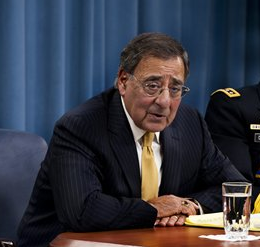
SecDef Panetta on Thursday / DoD photo by Erin Kirk-Cuomo
Words matter when you are in charge of the world’s biggest military. So I listened closely in the Pentagon briefing room Thursday as Leon Panetta warned of looming disaster if the congressional super-committee fails to strike a grand bargain and the dreaded “sequestration” ax falls. That could double Pentagon cuts over the coming decade from $450 billion to nearly $1 trillion, off a base of about $7 trillion:
Sequester will lead to a hollow force…It’s a ship without sailors. It’s a brigade without bullets. It’s an air wing without enough trained pilots. It’s a paper tiger, an Army of barracks, buildings and bombs without enough trained soldiers able to accomplish the mission. It’s a force that suffers low morale, poor readiness and is unable to keep up with potential adversaries. In effect, it invites aggression.
Panetta’s a politician, so he knows words count. His use of three phrases – “hollow force,” “paper tiger,” and “invites aggression” — in his opening, prepared remarks is striking.
Beyond that, he insists that such budget cuts will lead – not might lead – to that “hollow force” (these trite-ism are phrases good speechwriters avoid, because they boil down, in strictly technical military terms, to: Your mother wears combat boots).
If he really wanted to lead, and debate the issue honestly, he’d say something like this instead:
If these cuts come, we will end up with a smaller military. My job is to ensure that whatever size military we end up with, it will not be hollow. And if the country orders such cuts, we will have to trim some of the missions we have been carrying out. But I can assure you, whatever the size of our force: it will never become hollow on my watch.
Those would be the words of a real defense secretary. Instead, by tossing out not-so-bons-mots like “paper tiger” and “hollow force,” Panetta risks sounding more like the congressman from Monterey that he used to be, and not the defense secretary he is supposed to be.
Update: Pentagon spokesman George Little says Panetta’s “hollow force” argument makes sense because, under sequestration, all military accounts will have to get the same budgetary haircut (military personnel could be exempted, but then the rest would have to be cut a little deeper to offset the budget protection given the troops). “He pointed out that due to the size and nature of the cuts — which would be across the board in 2013 — sequester would prevent a strategy-driven implementation of defense spending reductions,” Little says, “Drastic cuts would, in fact, produce a hollow force. Sequester essentially leaves no room for strategy.”
Fair point. But the reality is that the government – which is forever drafting detailed war plans with little chance of ever happening – should adopt the same approach to its budget. It is sure looking like sequestration is coming, so planning to accommodate those cuts now – by drafting a 2013 budget that fits under the budget cap now set in law – would seem to be a smart thing to do. “This is why I have been saying they need to have budget options ready to go for FY13 in case the Super Committee fails—a `Plan B,’” says Todd Harrison of the Center for Strategic and Budgetary Assessments. “If sequestration goes into effect, it would be an incredible abdication of responsibility to allow it to blindly cut across all accounts equally. They can avoid that and they should be planning accordingly.”


